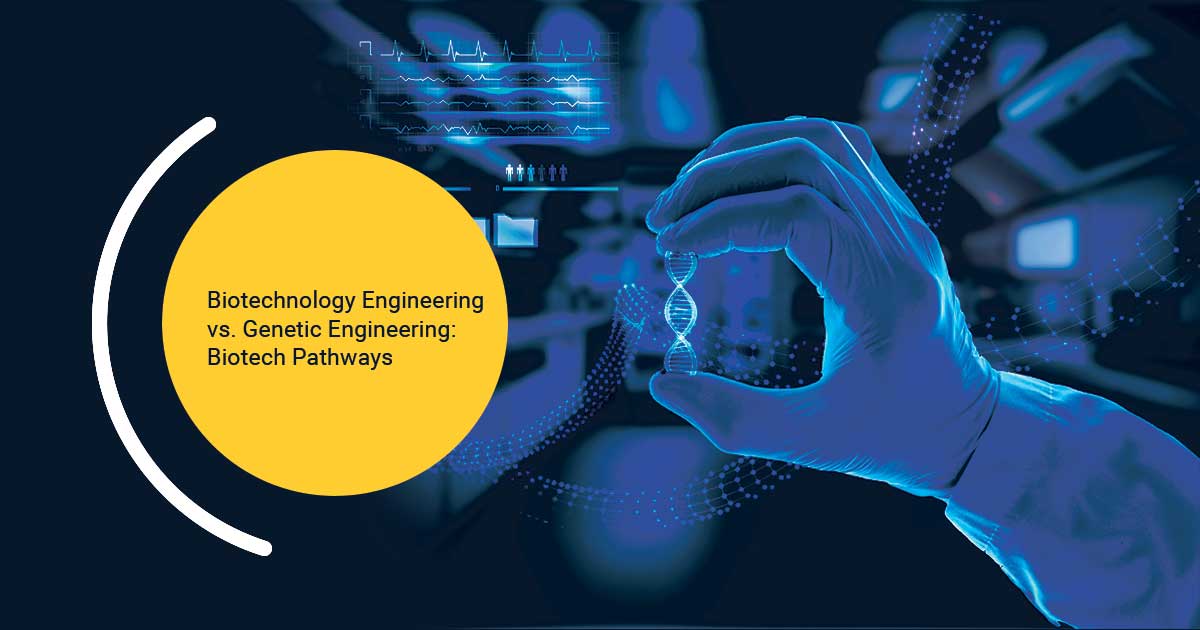FET Blogs


FET Blogs



05 February 2024
Table of Contents:
Biotechnology Engineering and Genetic Engineering are two closely related yet distinct biotech pathways that play pivotal roles in shaping the future of science and technology. Both disciplines harness living organisms' power and molecular processes but differ in their scopes, objectives, applications, and methodologies.
Biotechnology Engineering, often referred to simply as Biotechnology, is a broad field that integrates biological principles with engineering practices to develop innovative solutions for several industries. It encompasses multiple applications, including agriculture, medicine, environmental management, and industrial processes.
Genetic Engineering, conversely, is a subset of Biotechnology that focuses explicitly on directly manipulating an organism's genes. It involves altering the genetic material, typically DNA, to introduce desirable traits or eliminate unwanted characteristics. Genetic Engineering has revolutionised various fields, including medicine, agriculture, and industry, by allowing scientists to modify the genetic makeup of organisms. In the realm of medicine, Genetic Engineering has led to the development of gene therapies that hold the potential to treat and cure genetic disorders.
The duration of Biotechnology Engineering and Genetic Engineering programmes can vary depending on the level of study. Both fields typically offer a four-year bachelor's degree programme at the undergraduate level. Students pursuing a bachelor's in Biotechnology Engineering or Genetic Engineering undergo a foundational curriculum that includes core courses in biology, chemistry, mathematics, and engineering principles. For those seeking advanced degrees, such as master's or Ph.D., the duration can vary. A master's programme generally takes two years to complete, while a Ph.D. programme can extend for three to five years, focusing on advanced research and specialisation.
Biotechnology Engineering is a broad and multidisciplinary field with a wide range of subjects that provide students with a comprehensive understanding of biotechnological applications. Primary courses in biology, chemistry, and engineering are usually included in the curriculum. Specialised electives including molecular biology, bioinformatics, bioprocess engineering, and bioethics are then studied. Additionally, students enrolled in Biotechnology Engineering programmes may work in practical laboratory work to obtain hands-on experience in bioprocessing, genetic engineering, and protein expression. Additionally, optional courses may allow students to tailor their education based on their specific interests within the field.
Core areas of study include:
The curriculum for Genetic Engineering is more focused and specialised, emphasising molecular biology and genetic manipulation techniques. Students delve into the intricacies of DNA manipulation, gene expression, and the ethical considerations surrounding genetic modifications. Laboratory work is a significant component of Genetic Engineering programmes, where students gain practical skills in gene editing techniques such as recombinant DNA technology and cloning. The focused nature of the curriculum prepares students for precision work in manipulating genetic material.
Core courses often include:
Biotechnology engineers find diverse opportunities in pharmaceuticals, contributing to drug development and manufacturing. They play pivotal roles in agricultural biotechnology, enhancing crop yields and creating genetically modified organisms. In healthcare, they design medical devices and diagnostic tools, while environmental biotechnology offers roles in waste treatment, pollution control and sustainable resource utilisation. Food technologists work in the food industry to develop and improve processes for food production, preservation, and quality control. Research and development positions allow biotechnology engineers to explore innovative solutions like synthetic biology and bioinformatics.
On the other hand, genetic engineers focus on gene therapy, correcting genetic disorders, and advancing medical treatments. In agriculture, they contribute to genetically modified crops, creating plants with improved traits. Biomedical research offers opportunities to delve into the genetic basis of diseases. The field extends to genomic counselling, guiding individuals through the implications of their genetic information. Stem cell researcher explores the use of stem cells in genetic engineering applications, including regenerative medicine and tissue engineering. Genomic data analyst utilises bioinformatics tools to analyse genomic data, contributing to research in genetics and personalised medicine.
Both Biotechnology Engineering and Genetic Engineering open doors to impactful careers, shaping the future of medicine, agriculture, and biotechnology. While Biotechnology Engineering and Genetic Engineering share common roots and goals, they represent distinct branches with unique focuses and methodologies. Both fields contribute significantly to advancements in science and technology, driving innovation and shaping the future of various industries. Ultimately, the choice between Biotechnology Engineering and Genetic Engineering depends on individual interests and career aspirations within the broader realm of biotechnology and genetic sciences.
A1: Biotechnology types are medical, agricultural, industrial, and environmental.
A2: The USA leads in biotechnology due to research and industry opportunities.
A3: Yes, biotechnologists can become genetic engineers with specialised training.
A4: Biotechnology includes genetics but covers broader biological applications.
A5: Yes, genetic engineering offers high salaries due to its specialised nature.
Popular Post
17 February 2026
AIE Full Form
10 February 2026
AEIE Full Form
22 January 2026
AE Full Form
16 January 2026
What is Aerospace Engineering?
16 January 2026
What is Chemical Engineering?
Ask an Expert for Free